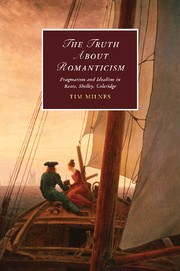Book contents
- Frontmatter
- Contents
- Acknowledgements
- Introduction: The pragmatics of romantic idealism
- 1 Romanticising pragmatism: dialogue and critical method
- 2 Pragmatising romanticism: radical empiricism from Reid to Rorty
- 3 This living Keats: truth, deixis, and correspondence
- 4 An unremitting interchange: Shelley, elenchus, and the education of error
- 5 The embodiment of reason: Coleridge on language, logic, and ethics
- Conclusion
- Notes
- Bibliography
- Index
- CAMBRIDGE STUDIES IN ROMANTICISM
2 - Pragmatising romanticism: radical empiricism from Reid to Rorty
Published online by Cambridge University Press: 06 July 2010
- Frontmatter
- Contents
- Acknowledgements
- Introduction: The pragmatics of romantic idealism
- 1 Romanticising pragmatism: dialogue and critical method
- 2 Pragmatising romanticism: radical empiricism from Reid to Rorty
- 3 This living Keats: truth, deixis, and correspondence
- 4 An unremitting interchange: Shelley, elenchus, and the education of error
- 5 The embodiment of reason: Coleridge on language, logic, and ethics
- Conclusion
- Notes
- Bibliography
- Index
- CAMBRIDGE STUDIES IN ROMANTICISM
Summary
In Chapter 1, I argued that the metacritical ‘cramps’ of modern romantic commentary are allayed by incorporating the ‘romanticised’ pragmatisms of Rorty, Habermas, and Taylor, and registered some helpful ideas concerning the relationship between truth and interpretation provided by Quine, Putnam, and Davidson. Pursuing this line of inquiry has meant delaying until now any further exploration of the connections between pragmatism and romanticism. In particular, it has meant deferring any assessment of the extent to which pragmatic or holistic attitudes to questions of truth and meaning already figure within romantic literature. While, at first glance, the latter might appear to be an unpromising enterprise, the very suspicions held by critics and historians regarding the hidden agendas of modern pragmatism would suggest otherwise. If, as Lentricchia and others have claimed, there is an underlying complicity between ‘romantic’ and ‘pragmatic’ worldviews, then it is not unreasonable to suppose that a strain of pragmatic thinking is already active within romantic culture. Given this, what is required at this stage is an explanation of why the attempt to ‘pragmatise’ the romantics should appear counterintuitive.
Accordingly, in this chapter I argue that such an account involves making a clear distinction between two empirical traditions within (and against) which British romantic writers work. The first of these is a doctrine of representational or epistemological empiricism that dates back to Locke and reaches its nadir in Hume's Treatise of Human Nature (1739–41).
- Type
- Chapter
- Information
- The Truth about RomanticismPragmatism and Idealism in Keats, Shelley, Coleridge, pp. 41 - 65Publisher: Cambridge University PressPrint publication year: 2010



